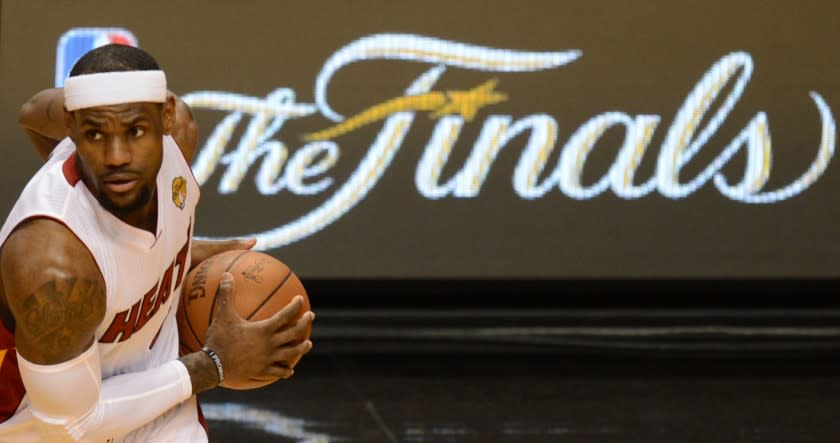How the Lakers' LeBron James grew into a champion with the Miami Heat

LeBron James was only 25 when he left the Cleveland Cavaliers to become a member of the Miami Heat, and expectations weighed heavily upon him when making that move.
He said he’d win multiple championships in Miami, so everyone held James accountable right away. Eventually he did, but it took growth and change, which is why he went there in the first place.
“I was still a kid and still trying to figure out who I am as a person and as a man, growing while still trying to compete for a championship every single year,” James said. “I grew, and they allowed me to grow. We pushed each other every single day, and like I said, I fit perfectly in that culture because I worked just as hard as anybody else.”
The Lakers will play the Miami Heat in Game 1 of the NBA Finals on Wednesday, starting a series that calls back to James’ past. By the time he joined the Lakers in 2018, he was a 33-year-old man who had grown into who he was and knew exactly what it took to win championships, having won two with the Heat and one upon his return to the Cavaliers in the summer of 2014. He came to the Lakers on a streak of eight consecutive NBA Finals appearances, and nine total in his career.
Now James has the opportunity to lead the Lakers to the franchise’s 17th championship. It’s a role he has in part because of who he became while playing for their opponent in this year’s Finals.
“Being a part of that culture allowed me to grow, allowed me to see what it takes to not only compete for a championship but also to win a championship,” James said. “So it definitely put me in a position where I knew what it took. I saw what it took. But also I fit that culture as well because of how hard I worked. It was a perfect match for those four years.”
It’s a four-year span that James, in an essay printed in Sports Illustrated, once described as having the same impact on him that going to college had for others.
At 25, James was a villain because he’d announced his move from Cleveland during a one-hour television special that upset stakeholders in his departure. He drew more ire after guaranteeing championships during an introductory celebration with Heat star Dwyane Wade and fellow free agent Chris Bosh, and then more when the Heat were a .500 team to start the season.
They quickly evolved into the best team in the Eastern Conference, , going into the playoffs their first season together as the second seed, and then winning the conference finals. They lost in the Finals to the Dallas Mavericks and the cries once again arose against James.
He was 26 and people wondered what was wrong with him — why hadn’t James won a championship yet. James himself felt devastated by the loss.
No wholesale changes came to the Heat, but there were adjustments. All the while, the Heat, led by Wade, James’ good friend, stayed the course.
“I think we all made each other better, we all needed each other for certain things,” said Udonis Haslem, the only current Heat player who was part of those teams. “I think Bron came down here as the greatest player in the world, but we helped out with the leadership. And the culture and the structure helped him get to where he wanted to go.
"I think what the good leaders do is they take stuff from other leaders that can help them be successful, and they implement those things and the way they go about it in their lifestyle and the way they approach the game.”
James became more vocal with his teammates the next season, more assertive by his own account. He won two consecutive championships with the Heat, then lost in the Finals again before moving on to the next challenge in Cleveland.
After he left the Heat, with each step he took, the people who were with him maintained their admiration.
“He's seen everything,” Miami coach Erik Spoelstra said. “At this point in his career, it's just about winning. And his ability to do what he does at his age is incredibly uncommon. But there's a lot of work that goes on behind the scenes to be able to maintain that.”
James, who turns 36 in December, insisted beating the Heat would not carry special meaning for him, saying he always appreciates how difficult it is to win a championship. His teammates aren’t so sure about that.
“He's a guy who obviously when he played against his former teams, he wants to win very bad, very badly, just like everyone else does,” Anthony Davis said. “But to be back in the Finals against Miami I think means a lot more to him winning this than anyone else. I think this championship is probably second behind Cleveland, being able to get this one for him.”

